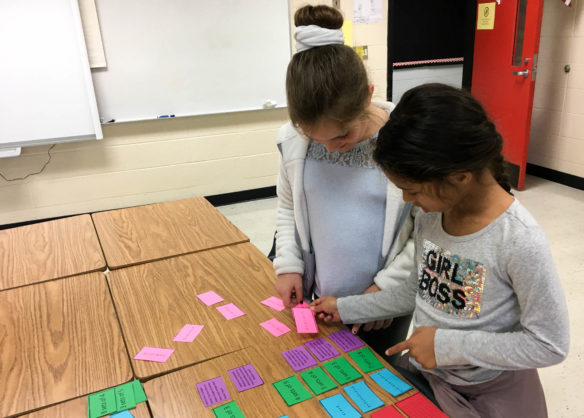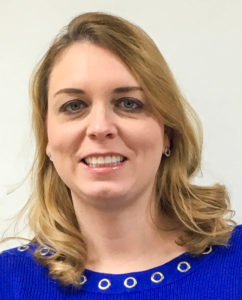
Third-graders, from left, Devan Stewart and Reille Parks work together to complete a multiplication formative assessment lesson in Shawna Hamilton’s class at Kirksville Elementary School (Madison County). The lessons are intended to help teachers understand student thinking and gauge their understanding of math ideas and applications.
Submitted photo by Sarah Shaffer
Leslie Lilly noticed something surprising this school year in her 5th-grade math classes at Kirksville Elementary School (Madison County).
“For the first time in a long time, I am finding my students are working harder than me,” she said following a formative assessment lesson on division with decimals.

Sarah Shaffer
This year, the mathematics teachers at Kirksville Elementary have been working to implement formative assessment lessons (FALs) into their units of instruction with the help of Sarah Shaffer, math coach for Madison County Schools. Formative assessment lessons are intended to be concept focused or problem solving in nature, and are intended to help teachers understand student thinking and gauge their understanding of math ideas and applications. Students work together in a FAL under the facilitation of the teacher to move their math reasoning forward.
A formative assessment lesson should occur about two-thirds of the way through a unit and be focused on the content standards and goals the teacher has for the students. The FAL should be used to identify where the students are at the given time of the lesson – including all of the misconceptions students have – relative to the standards and goals the teachers and students have set.
The formative assessment process begins by identifying what we want students to be able to perform to demonstrate their mastery of the content.
“We begin by identifying the standards for not only our grade level, but also the content above and below our own,” said Abby Brown, a 1st-grade teacher at Kirksville. Brown said it is important to share the learning goals and targets with students at the beginning of class and throughout the lessons in the unit they are studying.
With the standards identified, the teachers determine what potential tasks are available or begin to create tasks that will allow them to observe levels of learning and unravel misconceptions. Once the formative assessment is determined, the planning begins.
“The formative assessment is reviewed in its entirety by the mathematics teachers and the teachers complete the tasks together so that potential misconceptions and questions can be identified prior to the implementation,” Dottie Smith, a math interventionist with Kirksville, said.
Special education teachers Michael Smith and Lauren Etherington said it is very important to have everyone at the table for this planning and discussion. The perspective that the classroom teachers has set for goals can only be met by the support that is offered by the special education collaboration teacher, in order to enhance the student engagement for all learners.
The teacher begins the FAL by administering a formative assessment a few days prior to the planned lesson to help gauge the student’s current understanding of the content. The formative assessment should take no longer than 15 minutes. Once the assessment is administered, the teacher identifies the patterns – not scoring the assessment – to find like-thinking students.
“I am grouping my students with like thinking strategies that I don’t often see in the regular daily instruction,” Lilly said. “It is working beautifully.”
Once the FAL day arrives, the teacher activates the students’ thinking for the task at hand with a brief introduction and provides an entry point, such as a prompt or question, to engage learning for all students. The students work together with a partner to talk through their lesson activity and explain their individual thinking.
The goal is not to “finish” the task, but to provide all students with the opportunity to engage in a productive struggle and persevere in their math instruction, while taking ownership of their own learning. The teacher facilitates and provides feedback in the form of questions that can push their students’ learning forward.
Greta Royalty and Shawna Hamilton, 3rd-grade teachers at Kirksville Elementary, recently implemented the “Multiplication-Operations and Algebraic Thinking, Version 2” formative assessment lesson that is found on the Kentucky Department of Education website. Prior to the day of the assessment, the teachers had prepared the materials for distribution, strategically grouped students with like ways of thinking and like misconceptions, and thoughtfully planned the questions that they had prepared for each card set that would be used.
These questions can help the teacher guide the like-thinking students to push them forward with their work without interrupting their own work on the task. The development of the questions is crucial to the teacher facilitating the FAL successfully. Without the questions, the teacher is merely reacting to the student responses only.
“As the students worked, I was able to visit the groups and immediately identify their misconceptions and ask questions that not only clarified student thinking, but also served as a guide to the development of their own learning,” Royalty said. “The prepared questions helped students to persevere through each stage of the task.”
“It is empowering to see all students engaged and being successful during a formative lesson,” Kirksville Elementary Principal Starla Browne said “All students and their ideas are valued. There are no labels to student needs. The partners are paired with students that have similar thinking and together they enter math discourse that is amazing to hear and see, watching them develop as the students become an instructional resource for one another.”
This year, the teachers have journeyed together to learn how to establish a productive struggle for their students through the use of questioning, which has been enhanced by the use of the formative assessment lessons.
“It is no easy task,” said Jeanna Howell, a 2nd-grade teacher. “It requires planning, preparation and use of precious instructional time. It is only after the first challenging task that you truly understand the power behind the use of that instructional day.”
The teachers at Kirksville Elementary are learning together with the teachers at their feeder school, Madison Middle School, to implement the formative assessment lessons. Each time a FAL is used, the teachers are learning from their students more about not only the process, but also their students’ thinking and reasoning. The value of the learning that comes from the process and the conversations that occur from the event are so essential to the success of the learning that is taking place.
Kirksville Elementary invites you to come and see our work in action. If you are interested in visiting or learning more, please contact sarah.shaffer@madison.kyschools.us.
MORE INFO …
For more information on Formative Assessment Lessons (FALs), contact renee.yates2@education.ky.gov.
Sarah Shaffer is in her 19th year of teaching. She is in her first year at Madison County Schools serving as a math coach. Shaffer has her undergraduate degree in elementary education through Murray State University. She earned her master’s from the University of Kentucky in curriculum and instruction. Shaffer earned her Rank 1 in gifted education through Eastern Kentucky University, as well as second master’s in educational administration and supervision.



[…] responses as a whole to decide how to go through the rest of the learning unit. This story from Kentucky Teacher shares how teachers use FAL’s at Kirksville Elementary in Madison […]
[…] Kentucky Teacher – Using Formative Assessment to Guide Learning […]